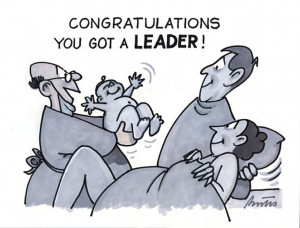“I must follow the people. Am I not their leader?” Benjamin Disraeli
Over the next two years, the RSA, in partnership with Power to Change, RIO and Sheffield University Management School, is delivering a leadership programme for community business leaders and will be exploring the unique leadership challenges faced by those leaders. As someone who helped Power to Change draft the tender document and assess the applications to run the programme, the issue of leadership is very close to my heart and this will be the first in a series of blogs over the coming period.
So, let’s start at the beginning. What is leadership? Such a simple question, and yet it has generated thousands of books and an industry in its own right. The ideas about leadership in management literature would have us believe that there are leadership traits, that there are leaders who are ‘great’, leaders who enable their people, that have a need for achievement, a certain style, interpersonal skills, and so on. In the many courses on leadership, managers will be told that they need to be trustworthy, charismatic, visionary, and obsessed with goals. They must challenge assumptions, behave as a role model, walk the talk, and empower their people. All perhaps relevant to the old hierarchical, command-and-control organisation of the last century. But what do we know about the reality of leadership today? What must leaders believe or know in order to influence others and create change?

Perhaps it might be easier to start with what leadership is not…
Leadership has nothing to do with seniority or one’s position in the hierarchy of a company. Often talk about a company’s leadership refers to the most senior executives in the organisation. They are though just that, senior executives. Leadership doesn’t automatically happen when you reach a certain pay grade. Hopefully you find it there, but there are no guarantees.
Leadership has nothing to do with titles. As with the point above, just because you have a CEO or Director-level job title doesn’t automatically make you a ‘leader’. You don’t need a title to lead - you can be a leader in your neighbourhood, in your family, within a social environment, all without having a title.
Leadership has nothing to do with personal attributes. Say the word ‘leader’ and most people think of a domineering, take-charge charismatic individual – the ‘heroic’ figure. We often think of icons from history like Churchill or Napoleon (who memorably said “A leader is a dealer in hope”) or from business like Richard Branson or Steve Jobs. Today we see a lot of criticism of Jeremy Corbyn precisely because he doesn’t (pretend to) have all the answers. But leadership isn’t an adjective. We don’t need extroverted charismatic traits to practice leadership. And those with charisma don’t automatically lead.
Leadership isn’t management. This is the big one. Leadership and management are not synonymous. Good management is needed. Managers need to plan, measure, monitor, coordinate, solve, hire, fire, and so many other things. Typically, managers manage things. Leaders lead people. To quote management guru Tom Peters: “Management is about arranging and telling. Leadership is about nurturing and enhancing.”
In fact, one of the major barriers to change we face today is that people think they have to wait for a leader to emerge – somebody who ‘knows better’, the ‘hero’ or traditional ‘leader’ who embodies the future. I think the very opposite is true. Over the years, I’ve learned to define leadership differently. A leader is anyone willing to help, anyone who sees something that needs to change and takes the first steps to influence that situation. It might be a parent who intervenes in their child’s school; or a woman in a rural village in India who works to get clean water; or a worker who refuses to allow mistreatment of others in her workplace; or a citizen who rallies the community to stop a library closure. Everywhere in the world, no matter the economic or social circumstances, people step forward to try and make a small difference. This is how the world always changes, with the actions of just a few people, when “some friends and I started talking.”
We have to nurture a new type of leadership that doesn’t depend on the illusion of extraordinary individuals. Indeed, the leadership of the future will not be provided simply by individuals but by groups, communities and networks. And these leaders must
“… work to create the space where people living with a problem can come together to tell the truth, think more deeply about what is really happening, explore options beyond popular thinking, and search for higher leverage changes through progressive cycles of action and reflection and learning over time.”
What a wonderful outcome that would be for the Community Business Leaders Programme!
Find out more about the RSA Community Business Leaders Programme
To correct this error:
- Ensure that you have a valid license file for the site configuration.
- Store the license file in the application directory.
Related articles
-
Leadership: can you put it in a wheelbarrow?
Stephen Clare
Following on from his recent blog on what leadership isn't Steve Clare FRSA tackles the more challenging task of explaining what leadership is...


Join the discussion
Comments
Please login to post a comment or reply
Don't have an account? Click here to register.
Dear Sir STEVE CLARE this article really inspire me to perform better in my social life.
i belongs to pakistan ,Gilgit Baltistan and have quest to practically applying the leadership style in my region. i agree with you leadership does not deal with seniority and position,it is all about when some one realize his/her presence for the betterment of community or become the beneficial bacteria for other, again fantastic awsome article love you........
Regards
Shamsher
Chairman
https://web.facebook.com/MyEducationFoundation/?fref=nf
Great article and this captures what leadership needs to be well. My caveat is that, 'yes' we are all leaders but not all of us are aware of the self and social awareness needed to make that principle really impactful in all the contexts we find ourselves in, and how best to adapt our behaviours to these changing contexts. So often we see people trying to lead but with out any thought for the impact their behaviours are having on others...particularly recently perhaps. Any leadership development community and place leadership needs to focus hard on this aspect to build a sustainable and adaptive leadership style.
Hi David
Thanks for the feedback.
I agree with your comment about the need for awareness of the self and social awareness. At the same time, I think that it's often through simply taking action that such awareness can grow. Remember the Miners' Wives back in 1984-85? I think the best 'leaders' are often those who seek to simply contribute rather than be 'a leader' - they unconsciously reflect (and shape) the zeitgeist. However, like you, I hope the leadership programme will look at and encourage reflection about adaptive and systems approaches.
Nice article Steve
I agree entirely with you that 'Leadership' crosses the boundaries of workplace, home and the community. The leader at work may be subordinate within the family group or within the community; so their role changes as they encounter those groups...or vice versa...but their leadership should endure. I use the acronym MYCASKI to remind myself of that belief....where
M = Make things happen and Make time for others
Y = do not dwell too much on Yesterday and You must want to do it
C = Challenge yourself and be Confident
A = always be Accountable and Allow others to grow
S = Set an example and See your goals
K = Know your limitations and improve your Knowledge
I = be emotionally Intelligent and Integrate relationships.
Best Regards
Raymond
@mycaski
www.mycaski.com
Hi Raymond
I like it. Great mnemonic with excellent content. Living by those 'rules' must be both liberating and fulfilling. If you don't mind, I think I'll print it out and stick it on my wall at home!
Regards
Steve
Excellent article Stephen.
Hi Gerry
Thanks for the feedback. I hope you also enjoy the follow-up blogs.
Regards
Steve
interesting to see if "servant leadership" features anywhere in this programme
Hi Alan
I make a 'signposting' reference to servant leadership in the follow-up blog which should get posted on 30th June and will be digging deeper in subsequent blogs. Like you, I hope the programme will look at the concept/practice of servant leadership.